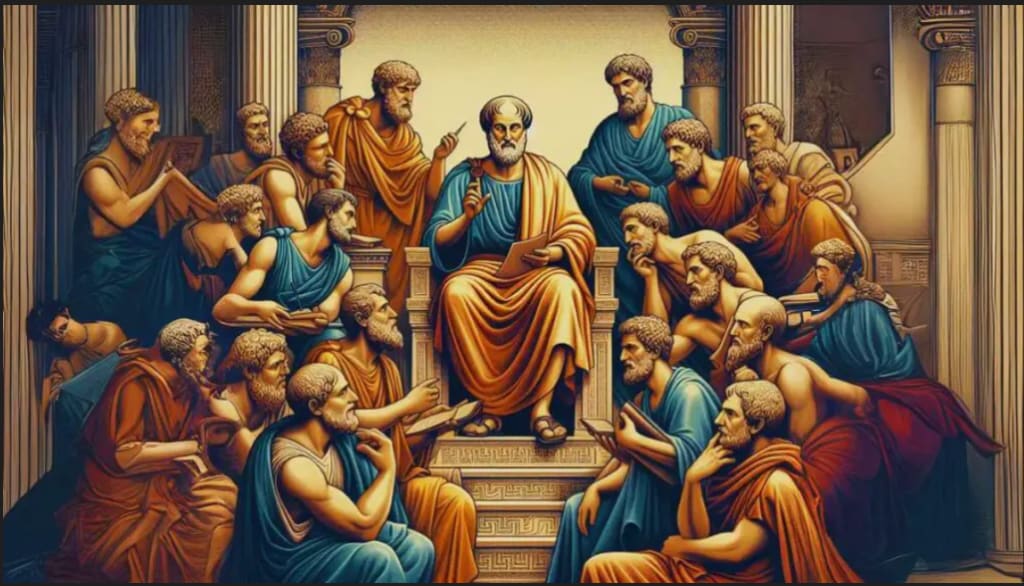Which Greek philosopher taught at the lyceum?
Greek Philosophical Schools: Establishments like the Lyceum and the Academy, showcasing the development of advanced educational and philosophical systems.

In the annals of ancient Greek philosophy, one figure stands out for his profound impact on Western thought, his rigorous methods of inquiry, and his enduring influence across centuries of intellectual discourse. His teachings spanned ethics, metaphysics, politics, and the natural sciences, shaping the foundations of modern philosophical inquiry and scientific methodology. Born in Stagira, a Greek colony in the Macedonian region, he studied under Plato at the Academy in Athens and later established his own school, known as the Lyceum, where he delved deeply into the nature of existence and the pursuit of knowledge.
At the heart of his philosophical framework lies a commitment to empiricism, a method of inquiry grounded in observation, experience, and systematic classification. Rejecting the purely abstract and idealistic approach of his teacher Plato, he sought to understand the world through tangible evidence and logical deduction. His writings encompassed a vast array of disciplines, ranging from the intricacies of biological classification to the complexities of ethical virtue and the ideal forms of governance. His intellectual legacy, transmitted through centuries of scholarship and debate, continues to shape our understanding of the human condition and our place within the cosmos.
Central to his philosophical inquiries was the exploration of ethics, an endeavor aimed at uncovering the nature of moral virtue and the principles that guide human conduct. Unlike his predecessors, who posited ethical truths as abstract ideals, he grounded his ethical framework in the practical realities of human experience. For him, virtue was not merely a theoretical concept but a practical disposition cultivated through habitual action and moral deliberation. His treatises on ethics, including discussions on courage, justice, and friendship, continue to resonate as foundational texts in moral philosophy.
Beyond ethics, his contributions to metaphysics were equally profound, shaping the contours of philosophical discourse on the nature of reality and the principles that underpin existence. In his exploration of metaphysics, he delved into the concept of substance, positing that all things are composed of form and matter, with form representing the essence or blueprint of a thing, and matter its physical manifestation. This dualistic framework laid the groundwork for subsequent philosophical inquiries into the nature of being, identity, and causality.
In the realm of political philosophy, he articulated a vision of the ideal state founded on principles of justice, moderation, and the common good. His seminal work on politics, influenced by his observations of various city-states and their forms of governance, sought to establish a framework for creating and maintaining a just political order. For him, the state was not merely a collection of individuals but a community bound together by shared values and a commitment to fostering human flourishing. His insights into the dynamics of power, authority, and civic duty continue to inform debates on governance and political theory.
In addition to his philosophical pursuits, he made significant contributions to the natural sciences, pioneering methods of observation and classification that laid the groundwork for modern scientific inquiry. His investigations into biology, zoology, and botany were based on systematic observations of the natural world, aimed at uncovering the underlying principles that govern the diversity of life forms. His treatises on animals, for instance, categorized species according to their distinctive characteristics and behaviors, marking a significant departure from earlier approaches based on mythological narratives and anecdotal accounts.
Central to his methodological approach was the use of logic as a tool for rigorous reasoning and argumentation. He developed the system of deductive reasoning known as syllogism, which became a cornerstone of logical inquiry and formal reasoning in Western philosophy and science. His emphasis on logical consistency and coherence served as a critical methodological principle, guiding subsequent generations of philosophers and scientists in their quest for knowledge and understanding.
Beyond his intellectual pursuits, he left an indelible mark on the cultural and educational landscape of ancient Greece, laying the groundwork for the establishment of institutions dedicated to learning and intellectual inquiry. His school, the Lyceum, became a center of philosophical debate and scientific investigation, attracting scholars and students from across the Mediterranean world. Through his teachings and writings, he sought not only to uncover the truths of the natural and moral worlds but also to cultivate a spirit of critical inquiry and intellectual curiosity among his followers.
In conclusion, the legacy of this ancient Greek philosopher transcends the boundaries of time and space, enduring as a testament to the power of human reason, curiosity, and intellectual endeavor. His systematic approach to philosophy and science, grounded in empirical observation, logical reasoning, and ethical inquiry, continues to shape our understanding of the universe and our place within it. As we continue to grapple with the fundamental questions of existence and meaning, his insights and teachings serve as a beacon of wisdom and enlightenment, guiding us on our journey of intellectual discovery and self-discovery.
About the Creator
Marveline Merab
“History never repeats itself. Man always does.”
― Voltaire
Enjoyed the story? Support the Creator.
Subscribe for free to receive all their stories in your feed. You could also pledge your support or give them a one-off tip, letting them know you appreciate their work.






Comments
There are no comments for this story
Be the first to respond and start the conversation.